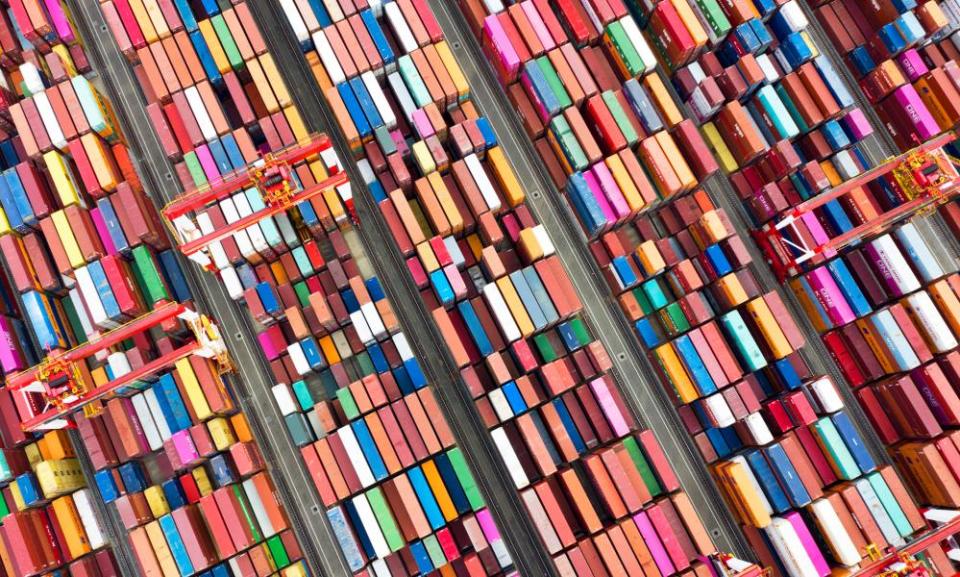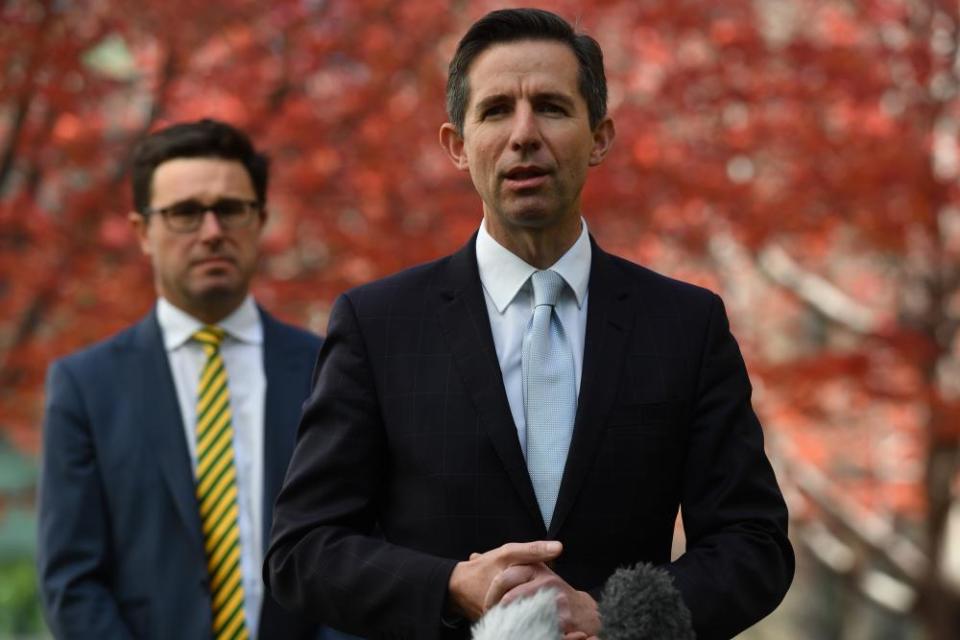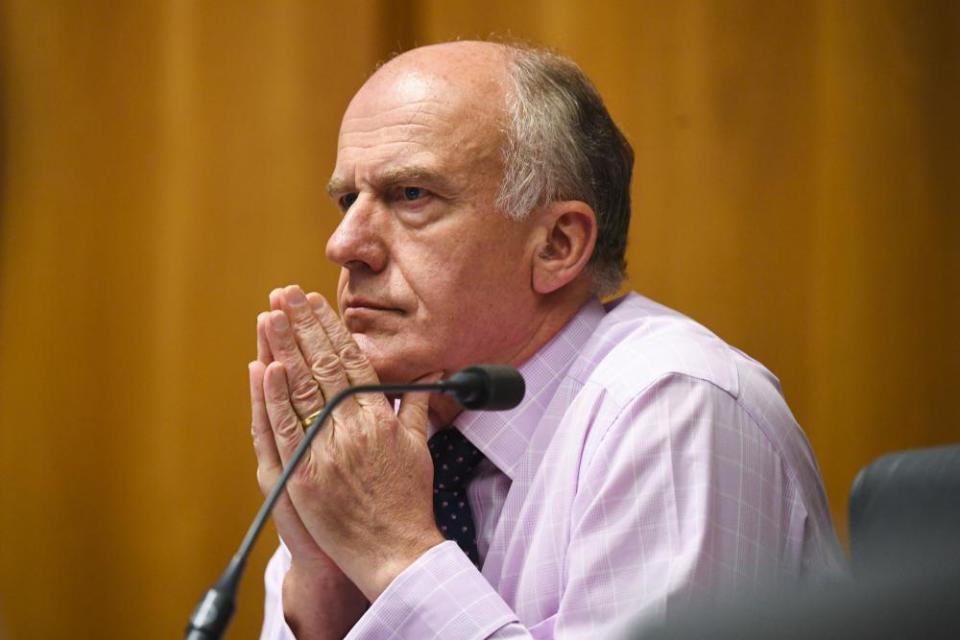How much is China's trade war really costing Australia?

China’s widening trade actions against Australia have disrupted exports worth up to $19bn a year, according to new analysis, sparking calls for the Morrison government to seek a reset in the relationship to forestall further economic pain.
On top of the hit to the barley, beef, cotton, coal and wine sectors, an additional $28bn worth of services exports could be at risk if Beijing’s warnings to its citizens against travel to Australia – based on claims of an elevated risk of racist attacks – prevents a post-Covid recovery in tourism and international education.
Labor’s agriculture and resources spokesman, Joel Fitzgibbon, said: “How much more harm must our economy suffer before Scott Morrison admits to his mistakes, swallows his pride, and puts an appropriate level of energy into fixing our relationship with our biggest trading partner?”
While it is difficult to quantify the cost of the trade war, research by the Perth USAsia Centre at the University of Western Australia shows the total value of exports to China from the seven industries affected by declared and undeclared sanctions was $47.7bn last year.
That includes $19.3bn of merchandise exports, plus $12.1bn in education services and $16.3bn of travel services. However, the impact of the warnings in the latter two segments is muted because Covid had already closed international borders.
Experts caution that a number of industries – like coal and beef – have suffered interruptions that are expected to reduce the volume of trade, but not reduce it to zero.
The Australian beef abattoirs that were hit with technical import permit bans are seeking to have them overturned in order to restore the trade, while other abattoirs continue operating. Some products, including barley which is now subject to a prohibitive 80% tariff, may end up being sold to different markets, albeit at a lower price.
Farmers fear wider disruptions
The National Farmers’ Federation said farmers “continue to be concerned about disruptions, real and touted, to the trade of agricultural products to China including barley, beef, wine and most recently, cotton”. China accounts for 28% of Australia’s annual agricultural exports.
NFF chief executive, Tony Mahar, said it was “vitally important the Australia-China relationship continues to develop in a positive way, based on mutual benefit and respect”. He called on the government, through the appropriate ministers, to keep reaching out to their Chinese counterparts to seek dialogue.
The trade minister, Simon Birmingham, reaffirmed to Guardian Australia on Tuesday night that Australia continued to “hold the door open to engage in respectful ministerial dialogue” with China.

He said Australia believed in “a partnership where each country respects the other’s sovereignty and encourages cooperation wherever possible”.
His comments follow Morrison’s previous statements that Australia would stand up for its values and not succumb to economic pressure. Australia’s vocal push earlier this year for an international inquiry into the origins and handling of Covid-19 angered Beijing, which complained it was a political move targeting China.
Dr Jeffrey Wilson, research director of the Perth USAsia Centre, said Australia’s attempts to open bilateral dialogue with China on the trade measures had failed. Birmingham had been “consistently rebuffed” in his attempts to open a line of communication with his Chinese counterpart since May.
Wilson said one credible option open to Australia was to refer the matter to an independent umpire through the World Trade Organization.
“Australia also has a very good chance of success in the barley, cotton and coal cases. This would be consistent with Australia’s longstanding commitment to rules-based multilateralism as a principle informing foreign policy,” he said.
Related: How does Australia balance its economic dependency on China with its democratic values?
But Wilson said the solution – proffered by some commentators – that Australia should “smooth over” the relationship with China in some way was not politically realistic, because there were many tensions in the partnership “that simply can’t be wished away”.
“And nor, on major issues of substance – foreign interference, human rights abuses in Xinjiang, and militarisation of the South China Sea for a few examples – should Australia compromise its foreign policy for the sake of short-term trade gains.”
Australian and Chinese people ‘will be the losers’
Labor’s trade spokeswoman, Madeleine King, urged the government to “seek counsel from Australian mining and agricultural companies and executives with deep business ties to China”.
“It should hold a forum to listen to corporate leaders who are gravely concerned about the relationship,” she said.
“This would provide the government with practical advice while indicating to everyone that we value our trading relationship with China.”
King also called on the government to be “more measured” in the way it communicated about China and put “a stop to the McCarthyist-style operations” of backbenchers such as Tasmanian senator Eric Abez, who demanded three Chinese-Australians appearing at a public inquiry unconditionally condemn “the Chinese Communist party dictatorship”.

“At every opportunity the prime minister and senior ministers should stress that the Australian and Chinese people will be the losers from a reduction in trade volumes between our two countries,” King said.
Future of coal exports up in the air
The Australian government is still trying to clarify the impact of Beijing’s latest reported moves to discourage the purchase of Australian coal and cotton.
BHP revealed earlier this month that some Chinese customers had recently deferred coal purchases, but a spokesperson was unable to shed any light on details such as the affected volumes.

Utilities and industrial buyers were reportedly contacted by Chinese authorities in early August and ordered to halt Australian imports immediately.
“Our understanding is that it was a very immediate verbal direction that you need to stop importing Australian coal now,” said Jo Clarke, a correspondent for the global commodity and energy price reporting agency, Argus.
“Colleagues have seen ships with Australian coal that are queued up to go to Chinese ports suddenly be pulled out of the queue and be rerouted to other destinations.”
Clarke said China operated an informal quota system that limited international imports of coal to about 270m to 290m tonnes a year – a system that had been in place since a collapse in the coal price in 2016 threatened the viability of domestic coalmines in China.
Related: The China challenge: 'To get a sense of how bad relations might get, look back to Menzies'
That meant there sometimes were disruptions to coal imports to China towards the end of a year, if the quota had already been met.
Clarke said Australia had already exported more coal to China in the first nine months of 2020 than the same time last year, because some of China’s other suppliers had cut their own exports and because other Australian target markets such as Japan, South Korea and Taiwan had stopped importing as much coal.
Australia exported nearly 75m tonnes of all coal types to China between January and September this year, up 14% from the same period last year, according to figures compiled by Argus.
“At some point Beijing said, ‘no more Australian coal’. The pragmatists say that’s because Australia has filled its part of the quota,” she said.
“The real concern, when I talk to the market, is what happens next year, whether Beijing is planning to change the system because of diplomatic tensions with Canberra or if the quota will just restart as normal. We don’t know that yet.”
Meanwhile, iron ore – a valuable Australian export – appears to have avoided any impacts from the trade tensions so far.
“This year we’ve not even heard whispers of them pulling back from Australian iron ore,” she said. However, she said China was developing other options that may provide alternative supplies in the longer term, such as Guinea.
The foreign affairs minister, Marise Payne, and Birmingham and their officials were due to face questions about the handling of the China relationship during Senate estimates hearings on Wednesday and Thursday.

 Yahoo Finance
Yahoo Finance 